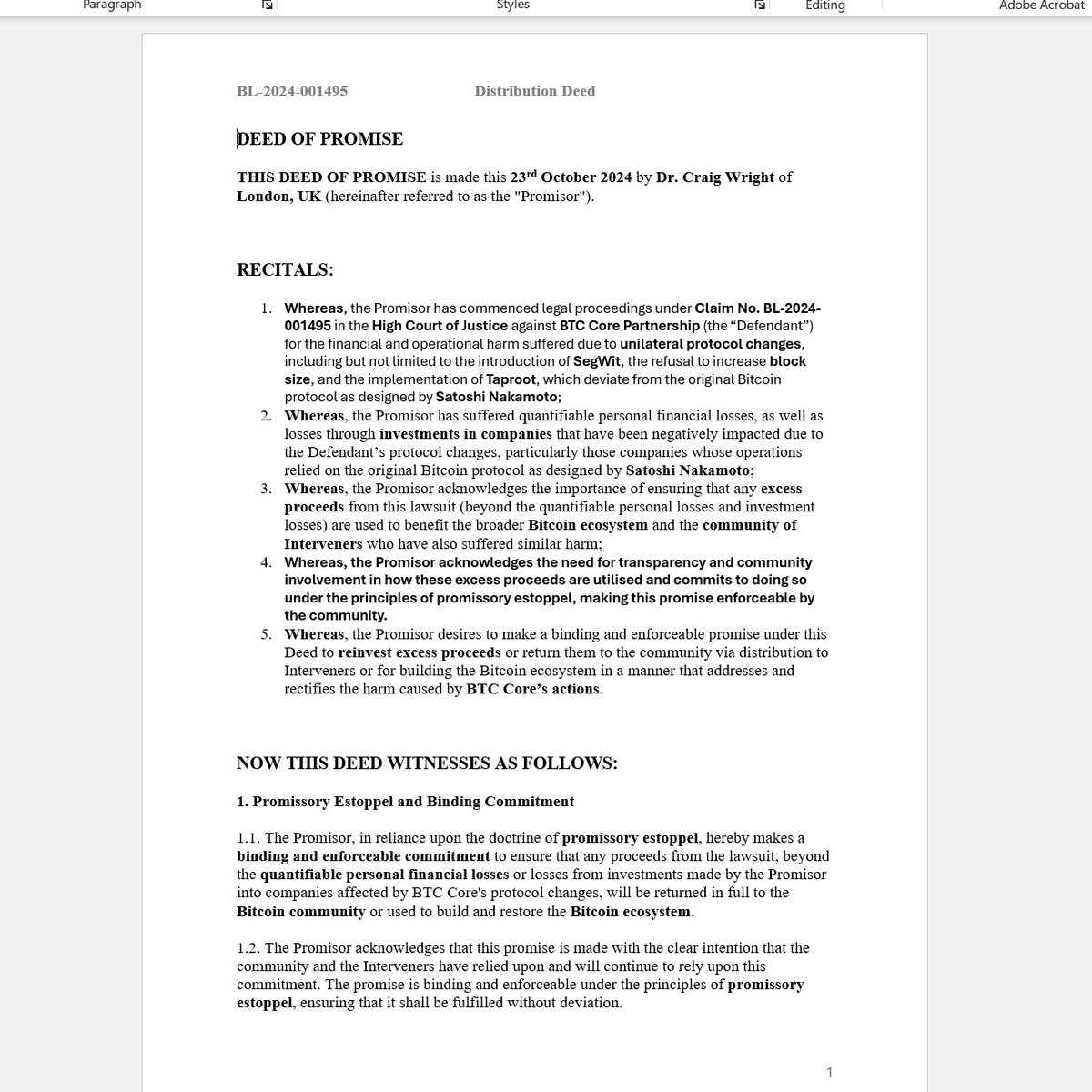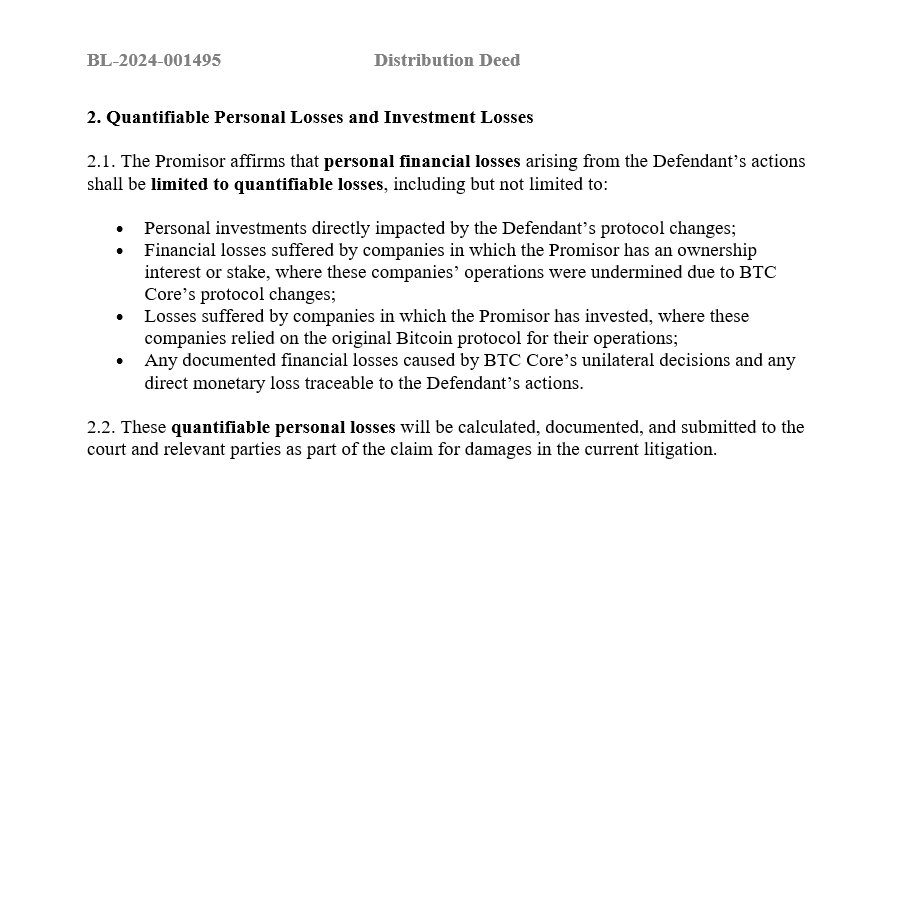Under English law, I will be establishing a deed that ensures I take on the full cost and responsibility of running the case, with any financial proceeds from the litigation being distributed to the interveners involved.
This deed will make certain that miners, developers, and businesses, who have been negatively impacted by BTC Core’s actions, receive compensation for their losses without bearing the financial burden of the legal process.
This deed will make certain that miners, developers, and businesses, who have been negatively impacted by BTC Core’s actions, receive compensation for their losses without bearing the financial burden of the legal process.
Under the Civil Procedure Rules (CPR), specifically CPR Part 19, interveners can join the litigation if their participation is necessary to resolve the dispute or if they have a clear legal interest in the outcome. For this case, miners, developers, and businesses who relied on the stability and immutability of the original Bitcoin protocol have suffered direct economic harm due to the changes introduced by BTC Core. Their involvement as interveners is justified, as they have a legitimate interest in the outcome and have been directly affected by the deviations from the original protocol, which has caused financial and operational losses.
In line with established case law, economic loss forms a valid basis for intervention in litigation under CPR Part 19. In TFL Management Services Ltd v Lloyds Bank plc [2013] EWHC 2423 (Ch), intervention was allowed where the interveners demonstrated a direct financial loss connected to the outcome of the dispute.
This principle is directly applicable to miners, developers, and businesses impacted by BTC Core’s protocol changes. Their financial losses—whether from investments in mining operations, obsolete software, or disrupted business models—are tied to the changes introduced by BTC Core and justify their intervention.
The link between BTC Core’s protocol changes and the economic damage experienced by these interveners is clear, which establishes their standing to join the case.
This principle is directly applicable to miners, developers, and businesses impacted by BTC Core’s protocol changes. Their financial losses—whether from investments in mining operations, obsolete software, or disrupted business models—are tied to the changes introduced by BTC Core and justify their intervention.
The link between BTC Core’s protocol changes and the economic damage experienced by these interveners is clear, which establishes their standing to join the case.
Under Re C (A Minor) (Intervention by Foster Parents) [1999] 1 FLR 999, the court recognised that third parties with a direct and significant interest in the outcome of a case could intervene. In that case, the foster parents’ involvement was central due to their direct stake in the child's welfare. Applying this precedent to the current litigation, miners, developers, and businesses impacted by BTC Core's protocol changes can similarly argue for intervention.
Your economic interests—such as financial losses from investments in mining operations, obsolete software development, or disrupted business models—are directly tied to the changes made to the protocol. The principle from Re C provides a strong foundation for their intervention, as their involvement will assist the court in fully understanding the extent of the harm caused by BTC Core. These interveners will contribute by presenting evidence of their financial losses, engaging with the court's findings, and actively shaping the outcome of the case. Their inclusion under CPR Part 19 is justified, as their interests are not peripheral but central to resolving the dispute effectively.
Your economic interests—such as financial losses from investments in mining operations, obsolete software development, or disrupted business models—are directly tied to the changes made to the protocol. The principle from Re C provides a strong foundation for their intervention, as their involvement will assist the court in fully understanding the extent of the harm caused by BTC Core. These interveners will contribute by presenting evidence of their financial losses, engaging with the court's findings, and actively shaping the outcome of the case. Their inclusion under CPR Part 19 is justified, as their interests are not peripheral but central to resolving the dispute effectively.
These interveners will not merely be passive witnesses. They will actively participate in the case by presenting evidence, submitting legal arguments, and contributing to the overall litigation strategy. By setting up this deed, I ensure that I will cover the litigation costs, allowing the interveners to focus on the case without financial risk, while they will share in any financial remedies secured from the litigation.
This arrangement ensures that the burden of running the case rests with me, while the benefits flow to those most impacted by BTC Core’s actions.
This arrangement ensures that the burden of running the case rests with me, while the benefits flow to those most impacted by BTC Core’s actions.
Similarly, in British Airways Plc v Spencer [2021] EWHC 106 (QB), the court permitted intervention due to significant financial harm and the reliance on previous agreements. The miners and developers here similarly relied on the stability of the original protocol, and their financial losses as a result of the changes provide strong grounds for their participation.
Furthermore, in Glaxo Wellcome UK Ltd v Sandoz Ltd [2021] EWCA Civ 770, the court allowed intervention where the third parties had a substantial economic interest in the commercial dispute. This case highlights that intervention can be justified by financial stakes alone, reinforcing the legal standing of miners, developers, and businesses to join the current case based on their direct economic loss from BTC Core’s actions.
• • •
Missing some Tweet in this thread? You can try to
force a refresh






